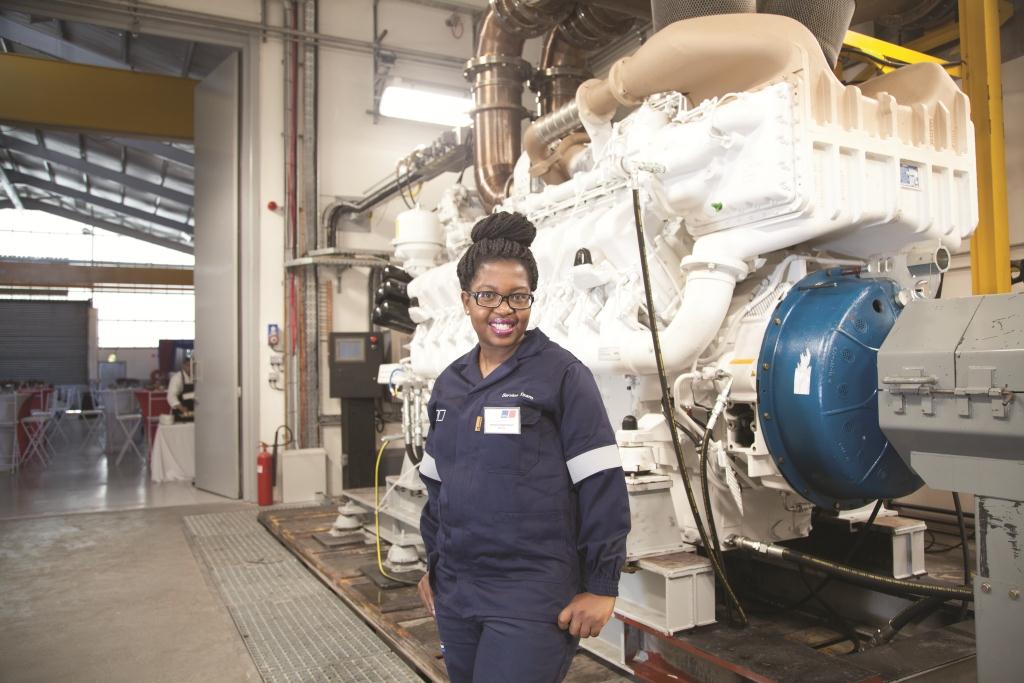They are new, blue and as powerful as eight Ferraris; these are the 232 train engines to be built by Rolls-Royce’s MTU South Africa (MTU SA) ready to roll out of Cape Town in South Africa and onto Africa’s railways.
“There are 7.2 billion people in the world, just in Africa, in 2010, we had estimates of 1 billion. By 2040, it will be double. By 2030, we will already need 50% more energy, 40% more water and 30% more food. How will you transport all that? We’re going to see mega cities especially in Asia and Africa. We need power and we need fuel efficiency and this is where rail comes in.”
So says Andrea Nono, CEO of MTU SA, at their refurbished offices in Montague Gardens, Cape Town. Here, MTU SA forked out R50 million ($3.53 million) to upgrade their factory to lay the foundation for expansion into Africa; their next big target.
“The message is simple and clear. We are changing Africa and hope to make a positive difference. It is a big moment for local manufacturing in South Africa. Let’s not forget the successes and the success stories. It is huge that an international company has been localized.”
It means MTU SA can now assemble, test and paint engines destined for anything from warships to mine trucks. The 232 engines are destined for Durban and run at a powerful 3,300kW and weigh 9.7 tonnes. This makes them lighter and cheaper than the Ferraris, jokes Nono.
Loading...

Andrea Nono and a completed engine
The engines come straight out of a £1.2billion investment into research and development made by Rolls-Royce in 2015, a business worth £76.4 billion.
One of those working on the engines is Pamela Tebogo Maphanga, a technician at MTU SA.
Maphanga, remarkably, grew up in Zebediela, a small rural area in Limpopo, without any electricity at all.
“I was very young. The fact that you could switch on a stove, it was something so amazing. There was no electricity, so we used to go into the field, get wood, make fire and then cook and cook. I had to fetch water because there were no taps,” she says.
“Everyone at my house, my mom, my aunties they are all nurses. I said no I wasn’t going to be a nurse. It has to stop somewhere.”
The 30-year-old Maphanga, started here as an apprentice and worked her way up. She is now an electrical technician as well as dyno tester, responsible for testing the fleet.
“It makes a huge noise when the engine is running. No one is allowed to go in.”
Maphanga also knows too well South Africa’s overburdened train system having had to take them while studying at college in Pretoria.
“The fun of running for a train, that excitement, always when you go home you run for the train going back after college you have to run for the train. I know them very well. The trucks [transporting goods that should be on trains] mess up our roads, they are too heavy for them.”
In 10 years’ time, Maphanga sees herself as a manager and wants to make a change.
“We need more women. I’ve proved that it can be done. April is going to be my fifth year being at MTU. There’s been a couple of challenges, that I’ve overcome. But I am here now and proud to be part of this male-dominated workplace. I am showing them how to do it. Especially since now I am a technician. I’ve grown, I used to be this shy little girl, now I’ve grown up and even have my own small project that I am working on,” says Maphanga.
These days, Maphanga doesn’t even notice the smell of diesel and grease on her overalls, even though the people she comes across when walking home from work do.
“It gets so normal it’s part of the daily bread. There are women and men stopping me on the side of the street asking where I work. They ask me how did I get here. They’ve got their own daughters who want to go to college and get here. To be like me.
“When I [started], everything was hard. Everything was too big for me, everything was too difficult for me, but I fought and fought. I asked questions when I didn’t understand and I learned.”
On this day, Maphanga’s story leaves as large an impression as the massive white engine, still to be painted in the fashion forward MTU blue, she stands behind. Like Maphanga, the boss Nono, also started working as an apprentice.
“I’ve been in this industry for almost 20 years. I grew up in it. For me personally, it’s great to actually have the impact as CEO having the liberty and pushing the diversity agenda even more in the business. The means also giving women the chance to shine in this industry even more,” says Nono.
MTU SA estimates there are 120,000 industrial engines in Africa alone, leaving plenty of work for the factory once the rail engines are complete.
Two women whose lives have changed thanks to engines that are more powerful than Ferraris and will certainly carry more goods than can fit into their boots.
Loading...
